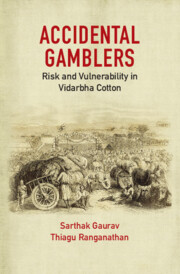5 - Inputs in the Cotton Gamble
Published online by Cambridge University Press: 18 April 2023
Summary
Are the dice loaded against the Vidarbha farmer in the gambles with cotton? Does the agrarian crisis stem from the nature of cotton cultivation? Taken together, the insights from the preceding chapter brought to the fore the limited livelihood diversification options for households and the overarching dependence on cotton cultivation. Even the outcomes of landless non-cultivator households hinge on the fate of cotton every season, given its importance in absorbing agricultural labour from the villages and their vicinity.
In this chapter, we discuss the changes related to agricultural inputs and agronomic practices of cotton cultivation. These changes have elements of accidentality as well as gambling akin to developments that have transpired in the history of the region's cotton economy. While doing so, we connect the findings to technological changes, policy environment, and behavioural motivations of farmers in their input choices. In particular, we address the following questions: How do farmers choose their inputs in cotton cultivation? What have been the changes in the input use patterns over the last decade? What has been the implications of these changes on farmer incomes?
Having examined several experiments with cotton seeds during the colonial period in Chapter 2, we begin by focusing on the input that has amassed the most attention in recent times—seeds. Over the past two decades, the seed market for cotton has undergone tremendous changes that have generated intense debates. At the centre of the debates has been the issue of proliferation of Bt cotton. The debates have revolved around issues of yield effects, monocultures, monopoly of multinational and agribiotech firms such as Monsanto, regulation, health hazards, and seed sovereignty, among others. In this backdrop, as if history has repeated itself, there has been an emergence of ‘loose’, ‘stealth’, and ‘illegal’ cotton seeds in the form of herbicide tolerant (HT) Bt seeds (HTBt henceforth).
These debates notwithstanding, what was the experience of Vidarbha's cotton farmers with growing Bt cotton? Following our discussion of seeds, we move on to an equally critical input in cotton cultivation—pesticides. In particular, we explore the patterns of Bt cotton and pesticide usage in cotton cultivation. We comment on the rationale of decision-making by farmers in relation to pesticides by examining their use over a two-year period.
- Type
- Chapter
- Information
- Accidental GamblersRisk and Vulnerability in Vidarbha Cotton, pp. 269 - 314Publisher: Cambridge University PressPrint publication year: 2023



